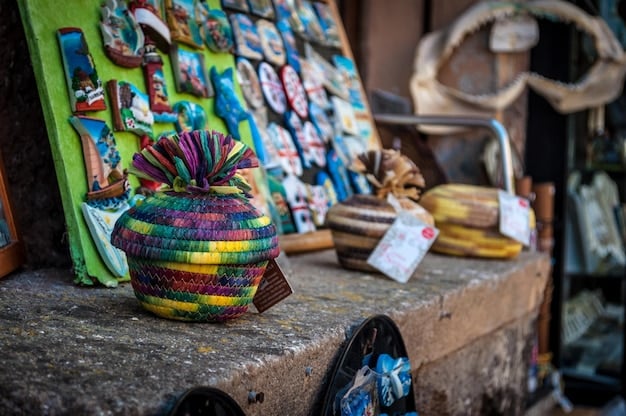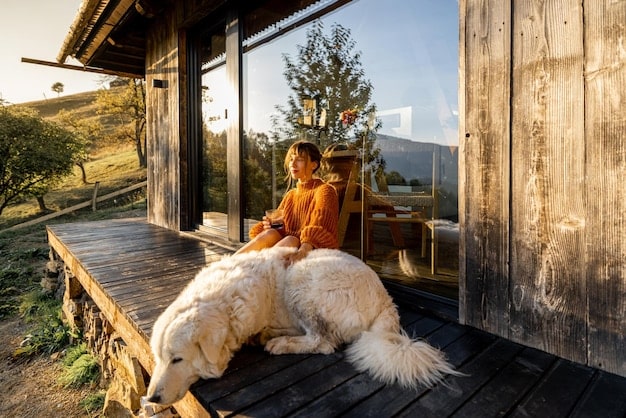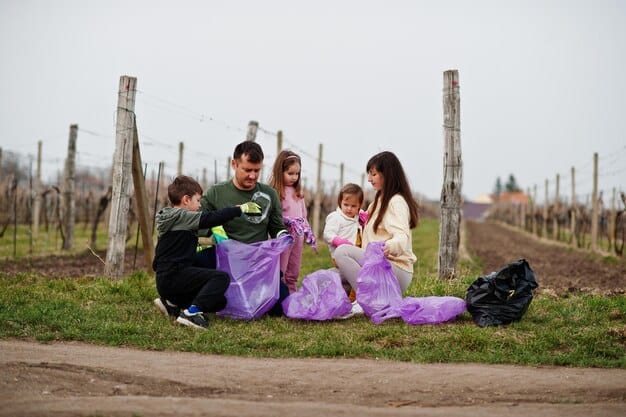The Ethical Traveler’s Guide: Supporting Local Communities in Peru

The Ethical Traveler’s Guide to Supporting Local Communities in Peru emphasizes responsible tourism by respecting local cultures, economies, and environments, ensuring that travel benefits the residents and preserves the country’s heritage.
Embarking on a journey to Peru? Discover how to be an ethical traveler’s guide to supporting local communities in Peru, enriching your experience while contributing positively to the lives of Peruvians.
Why Ethical Travel Matters in Peru
Ethical travel is more than a trend; it’s a commitment to responsible tourism that respects and supports local communities. In Peru, where tourism can significantly impact local economies and cultures, traveling ethically ensures your visit contributes positively.
When you choose ethical travel, you’re not just seeing the sights; you’re investing in the well-being and preservation of the communities that make Peru so unique. It’s about making choices that minimize harm and maximize the benefits to the people and places you visit.
Preserving Cultural Heritage
Peru’s cultural heritage is rich and diverse, but it’s also vulnerable to exploitation. Ethical travel helps preserve traditions by supporting artisans, respecting local customs, and avoiding activities that may degrade cultural sites.
Boosting Local Economies
By choosing locally-owned businesses, accommodations, and tour operators, you ensure that your money stays within the community, creating jobs and fostering sustainable economic growth.
- Opt for family-run hotels and guesthouses.
- Eat at local restaurants that source ingredients from nearby farms.
- Buy handicrafts directly from artisans at fair prices.
Ethical travel in Peru means being mindful of your impact and making choices that support the long-term sustainability of the communities you visit. It’s about traveling with respect, empathy, and a genuine desire to make a positive difference.
Choosing Local Accommodations and Businesses
One of the most direct ways to support local communities in Peru is by choosing locally-owned accommodations and businesses. These enterprises are deeply connected to the community and reinvest their profits locally, creating a ripple effect of economic benefits.
When you stay at a family-run guesthouse or eat at a local restaurant, you’re not just enjoying a unique experience; you’re directly contributing to the livelihoods of Peruvian families and helping them thrive.

Finding Authentic Experiences
Local accommodations and businesses often offer unique and authentic experiences that you won’t find in large, international chains. These experiences provide deeper insights into Peruvian culture and traditions.
Supporting Sustainable Practices
Many locally-owned businesses are committed to sustainable practices, such as using eco-friendly materials, conserving water, and supporting local conservation efforts. By choosing these businesses, you’re promoting environmental responsibility as well as economic development.
Choosing local accommodations and businesses is a powerful way to ensure that your travel dollars directly benefit the communities you visit. It’s about prioritizing authenticity, sustainability, and the well-being of Peruvian families.
Supporting Indigenous Artisans and Craftspeople
Peru is renowned for its rich artistic traditions, passed down through generations of indigenous artisans and craftspeople. Supporting these artisans is a crucial part of ethical travel, helping to preserve cultural heritage and provide sustainable income for local communities.
By purchasing handicrafts directly from artisans at fair prices, you’re not just acquiring a beautiful souvenir; you’re investing in the continuation of traditional skills and empowering indigenous communities to maintain their cultural identity.
Fair Trade Practices
When buying handicrafts, look for fair trade certifications or organizations that ensure artisans receive a fair price for their work. This helps to combat exploitation and promotes economic justice.
Respecting Intellectual Property
Be mindful of intellectual property rights and avoid purchasing counterfeit or imitation goods. Support artisans who create original designs and respect traditional motifs.
- Visit local markets and workshops to meet artisans and learn about their craft.
- Ask about the origin of the materials used and the techniques employed.
- Offer a fair price for the goods, recognizing the time and skill involved in their creation.
Supporting indigenous artisans and craftspeople is a meaningful way to connect with Peruvian culture and contribute to the economic empowerment of local communities. It’s about valuing tradition, respecting creativity, and ensuring that artisans receive the recognition and compensation they deserve.
Responsible Wildlife Tourism
Peru’s diverse ecosystems are home to a stunning array of wildlife, from the Amazon rainforest to the Andean highlands. Responsible wildlife tourism is essential to protect these fragile environments and ensure the well-being of the animals that inhabit them.
When engaging in wildlife tourism, choose operators that prioritize conservation, respect animal welfare, and educate visitors about the importance of protecting Peru’s biodiversity. Avoid activities that may disturb or harm wildlife, such as feeding animals or getting too close to their habitats.
Choosing Ethical Tour Operators
Select tour operators that are committed to sustainable practices, such as minimizing waste, using eco-friendly transportation, and supporting local conservation projects.
Respecting Habitats
Stay on designated trails, avoid disturbing vegetation, and refrain from making excessive noise that could frighten or stress animals.
Responsible wildlife tourism is about observing animals in their natural habitats without interfering with their behavior or threatening their survival. It’s about appreciating the beauty and diversity of Peru’s wildlife and contributing to its long-term protection.
Minimizing Environmental Impact
Traveling in Peru offers incredible opportunities to experience breathtaking landscapes and unique ecosystems. However, tourism can also have a significant environmental impact, from waste generation to resource depletion. Minimizing your environmental footprint is a key aspect of ethical travel.
Simple actions, such as reducing your consumption of single-use plastics, conserving water, and properly disposing of waste, can make a big difference in protecting Peru’s natural resources and preserving its beauty for future generations.

Reducing Plastic Use
Carry a reusable water bottle, shopping bag, and utensils to avoid single-use plastics. Refuse plastic straws and opt for reusable alternatives.
Conserving Water and Energy
Be mindful of your water usage by taking shorter showers and turning off the tap when brushing your teeth. Conserve energy by turning off lights and air conditioning when you leave your room.
- Choose accommodations that have implemented sustainable practices, such as solar panels or water recycling systems.
- Support restaurants that prioritize local and organic ingredients, reducing the carbon footprint of food transportation.
- Participate in community clean-up events to help remove litter and protect local ecosystems.
Minimizing your environmental impact is an essential part of ethical travel. It’s about being conscious of your consumption, reducing waste, and supporting sustainable practices that protect Peru’s natural environment.
Respecting Local Customs and Traditions
Peru is a land of diverse cultures and traditions, each with its own unique customs and etiquette. Respecting local customs is essential to ensuring that your visit is welcomed and contributes positively to the communities you encounter.
Take the time to learn about local customs and traditions before you travel. Be mindful of your behavior, dress modestly, and avoid actions that may be considered disrespectful or offensive. Engage with locals respectfully, listen to their stories, and show genuine interest in their culture.
Learning Basic Phrases
Learning a few basic phrases in Spanish or Quechua can go a long way in showing respect and facilitating meaningful interactions with locals.
Asking Permission
Always ask permission before taking photos of people, especially in indigenous communities. Respect their wishes if they decline.
Respecting local customs and traditions is about demonstrating cultural sensitivity, showing empathy, and engaging with Peruvians in a respectful and meaningful way. It’s about recognizing the value of cultural diversity and contributing to the preservation of Peru’s rich heritage.
| Key Point | Brief Description |
|---|---|
| 🏠 Local Stays | Choose locally-owned accommodations for authentic experiences. |
| 🛍️ Artisan Support | Purchase handicrafts directly from artisans at fair prices. |
| 🌱 Eco-Friendly | Minimize plastic use and conserve natural resources. |
| 🙏 Respect Culture | Respect local customs and traditions. |
Frequently Asked Questions
▼
Ethical travel in Peru means making responsible choices that benefit local communities, preserve cultural heritage, and minimize environmental impact. It focuses on respecting the local cultures and contributing to sustainability.
▼
You can support local economies by choosing locally-owned accommodations, dining at local restaurants, purchasing handicrafts directly from artisans, and using local tour operators. This ensures that your money stays within the community.
▼
Minimize your impact by reducing plastic use, conserving water and energy, choosing accommodations with sustainable practices, and supporting local restaurants that use organic ingredients. Always dispose of waste properly.
▼
Respect local customs by learning basic phrases in Spanish or Quechua, asking permission before taking photos, dressing modestly, and being mindful of your behavior. Show genuine interest in local cultures.
▼
Look for tour operators that are committed to sustainable practices, support local conservation projects, respect animal welfare, and educate visitors about the importance of protecting Peru’s biodiversity and cultural heritage.
Conclusion
By embracing the ethical traveler’s guide to supporting local communities in Peru, you can transform your journey into a meaningful contribution to the country’s sustainable development. Every conscious choice you make – from selecting accommodations to purchasing souvenirs – empowers communities, preserves cultures, and protects the environment for generations to come.





